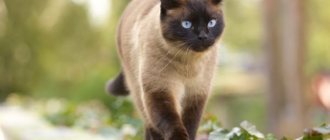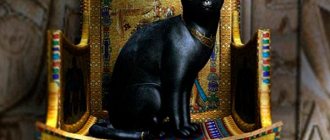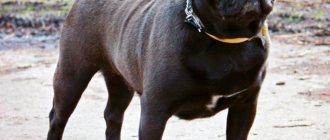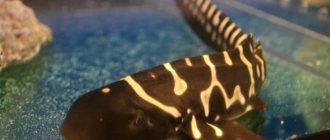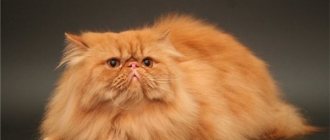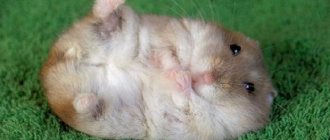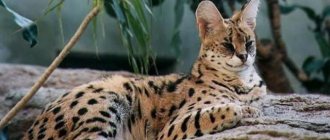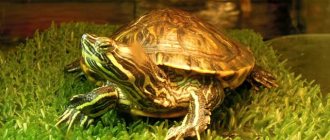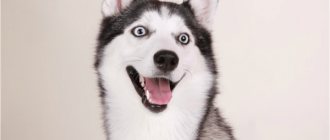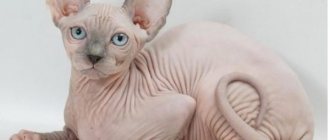Diseases in old cats
Older cats are at greater risk of disease because their immune system is weakened.
The most common diseases that occur more often in old age:
- diabetes;
- renal failure;
- hypertrophic cardiomyopathy;
- hepatic lipidosis;
- hyperthyroidism;
- cancerous tumors;
- pyometra;
- systematic constipation;
- dental diseases.
Dental disease is common in older cats.
The common cause of these diseases is, as a rule, a decrease in immunity due to “wear and tear” of the body.
Symptoms of “adult” diseases
A sign of diabetes is a cat's constant thirst.
A characteristic sign of diabetes mellitus is incessant thirst and frequent urination . There is also severe exhaustion due to increased appetite. However, these signs are not easily observed in cats that have free access to unlimited outdoor exercise.
Kidney failure
With kidney failure, a cat experiences a constant urge to urinate.
The initial stage of renal failure is usually asymptomatic, but then polydipsia manifests itself - incessant thirst.
The animal experiences a constant urge to urinate, urinating in small portions, often to no avail. Urine loses color and often looks like ordinary water.
Refusal to eat
The cat refuses food and vomits. In some cases, the pet experiences difficulty with the swallowing reflex. If not treated in a timely manner, lethargy is possible.
When sick, vomiting may occur.
Hypertrophic cardiomyopathy
Hypertrophic cardiomyopathy is accompanied by a periodic cough.
The initial stage of hypertrophic cardiomyopathy practically does not manifest itself in anything. Then periodic cough and shortness of breath appear. There is cyanosis of the visible mucous membranes, and a decrease in the cat’s activity due to exercise intolerance. Paresis of the hind limbs is possible.
Lipidosis
Lethargy is one of the signs of liver lipidosis.
Signs of liver lipidosis appear very slowly, and there are no obvious sharp symptoms.
Gradually, the animal’s activity decreases, apathy and lethargy sets in, and the fur becomes dull. In severe and advanced cases, signs of a nervous disorder occur, possibly a coma.
Hyperthyroidism
A sharp decrease in weight in a cat is a sign of hyperthyroidism.
The first obvious symptom of hyperthyroidism is a sharp weight loss with increased appetite.
The progressive disease is characterized by the onset of vomiting, increased thirst, increased urine volume, and tachycardia. The coat is dull, disheveled, and may be partially lost. Diarrhea and signs of a nervous disorder are often observed - anxiety, agitation, aggression, unreasonable activity.
Pyometra
A strong increase in temperature is observed with pyometra disease.
A common disease for elderly females is pyometra.
Main signs : spotting discharge from the vulva, severe fever.
The abdomen is painful, enlarged and hard to the touch. Lack of appetite and increased thirst. Possible digestive system upset and frequent urination. Apathy, heavy breathing, lack of the usual reaction to the owners, difficulty moving.
Oncology
Few people know that cats, just like people, are susceptible to cancer. And, unfortunately, they are becoming more and more common. Diagnosis of oncology is complicated by the fact that in the early stages the signs are invisible. Owners often notice the disease in the later stages. Signs include poor appetite, lethargy, deterioration in coat quality, spots on the skin, difficulty breathing and tumors appearing on the body. In each case everything is individual. Treatment is carried out with chemotherapy and surgery.
Disease prevention is the best way to keep your pets healthy. Therefore, it is necessary to provide the cat with good nutrition, a comfortable place to live, and support its immunity from the moment it arrives in the house. Even if your pet is constantly in the apartment and does not go for walks, you should think about vaccination.
Features of the treatment of diseases in old cats
The first step in treating diabetes is a balanced diet . A high protein, low carbohydrate diet is required. The basis of therapy is insulin, which is prescribed only by a veterinarian.
The first step in treating diabetes is a balanced diet.
Help in the treatment of renal failure consists of influencing the primary cause - hormonal drugs, antibiotics . Cleansing the body of toxins - forced diuresis, intestinal dialysis, blood purification. Maintaining general condition - diet, heart medications. Medicines to prevent bleeding in the digestive tract, adjusting mineral balance.
Therapy
Therapy for hypertrophic cardiomyopathy includes the use of beta blockers in the form of atenolol, propranolol. Calcium channel blocker - diltiazem. ACE inhibitor – ramipril, enapril. The ARBs inhibitor is telmisartan. Additional agents – pimobendan, furosemide.
Therapy for hypertrophic cardiomyopathy includes the use of atenolol.
It is impossible to completely cure hepatic lipidosis.
Medications are used to help relieve symptoms and slow down the disease. Intravenous nutrition is prescribed for a month, protein foods are eliminated. If there is an improvement, but the animal has no appetite, nutrition is given through a tube inserted directly into the esophagus. Recommended substances : phylloquinone, multivitamins, Tagamet, Zantac, metoclopramide, neomycin, metronidazole.
Hyperthyroidism is treated by three methods - thyrostatics, surgery, iodine therapy. The most effective method is the use of radioactive iodine therapy. This method is carried out through injections that are administered under the skin.
Removing pymetra in older cats
In most cases, removing the pymetra from females is perhaps the only way out of the situation. Surgical intervention consists of complete removal of the uterus, along with the ovaries and all pyogenic contents. Medical assistance – hormonal drugs, antibiotic therapy, symptomatic treatment.
Often, removing the pymetra from females is the only way out of the situation.
Most common disease
The list of diseases is long, and others may be added to it. Many can appear in small, adult young individuals, and only get worse in old age:
- Kidney failure.
- Diabetes.
- Pyometra.
- Hypertrophic cardiomyopathy.
- Hyperthyroidism.
- Oncological diseases.
- Dental diseases.
- Eye diseases.
Why do cats have the biggest health problems as they age? With each year of adult life, the body’s immunity decreases, it fights less against the onset of a particular disease. The body wears out, it is more susceptible to viruses and bacteria, and it is more difficult to endure injuries. And this once again suggests that you need to be doubly attentive to an old pet.
It is not difficult to do this; it is enough to observe the pet, analyze its behavior and note changes in it. For example, an elderly cat refuses food for a long time. This is unlikely to be due to the heat; a healthy animal cannot avoid eating for a long time . It is imperative to identify other symptoms, show the cat to the veterinarian, and tell him about your observations.
General recommendations for treatment and care
The cat's exhaustion, symptoms and treatment depend on the type of disease, which can only be determined by a doctor. He conducts examinations and diagnoses, including on the basis of tests. But there are general tips for those who are faced with such problems in the life of a pet.
A cat or an old cat is sick - what to do?
- The pet should be created comfortable conditions, eliminate stress, noise, and the presence of large numbers of people in the house.
- You need to take care of a balanced diet, regardless of the type of disease. The stress that occurs with large doses of feed is harmful to an exhausted body.
- A visit to the veterinarian, his supervision of treatment and rehabilitation is the main condition for recovery.
Unfortunately, it is not always possible to cure an old pet; the body can no longer provide significant resistance to the disease. But the person must do everything possible to help the cat.
Eyes and ears
As cats age, vision can deteriorate due to age-related changes. But it is also possible that certain eye diseases may arise that require treatment:
- The inflammatory process is indicated by excessive tearing, pus in the corners of the eyes, and clouding of the lens. Special drops, other medications, and ointments will help.
- If an old cat has otitis media, she will constantly shake her head, trying to get her paw into the ear. This disease causes severe pain in the ear; it is imperative to rid the cat of it as quickly as possible. Otitis media can be easily cured, just don’t delay in seeing a doctor.
Gastrointestinal tract
Cats may suffer from chronic gastritis and constipation . This is often due to poor diet and wool getting into the stomach. The main directions of treatment are a strict diet, restoration of intestinal microflora with the help of special medications, restoration of immunity.
It should be taken into account that as a pet ages, it becomes less mobile, and the dose of food now needs to be adjusted.
Teeth
Any disease gives an old cat a lot of problems and unpleasant moments, even if it is non-fatal. Not all cat owners remember that as they age, their pet’s dental health may deteriorate. If you don't check your cat's teeth regularly, periodontal disease will develop over time.
The cat will not be able to eat normally, he will only bite off small pieces. Sometimes pain and discomfort lead to the animal simply throwing food and meowing loudly. In such a situation, it is worth seeing a veterinarian and talking about your pet’s behavior:
- Your cat may have tooth decay.
- Pulpitis also causes severe pain and discomfort.
- Stomatitis and gingivitis are also painful.
Such diseases are often caused by tartar . Dental problems can be identified by the following signs - unpleasant odor from the mouth, brown plaque on the teeth, deep red color of the gums. Dental problems are eliminated in a veterinary clinic.
